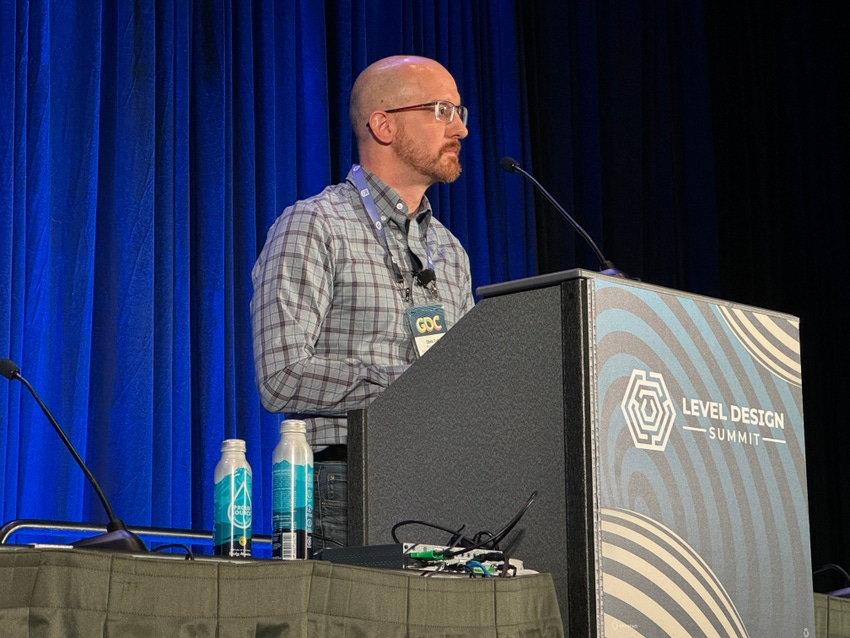
Read More from GDC 2024 | Keep up with the latest game industry event coverage from GDC 2024, including news, talks, interviews, and more from the Game Developer team.
Avoiding the 'compliment sandwich:' Techniques for mentoring others in the art of level design
Christopher Totten explains why mentoring others in level design can be such a problem and how to take time to teach without interrupting the pipeline.

At the GDC 2024 Level Design Summit, Christopher Totten—Assistant Professor in the Animation and Games category at Kent State University and founder of Pie for Breakfast Studios—explained the key points for teaching level design to interns and other juniors in both academic and studio contexts.
Totten began by pointing out that mentoring is an inconsistent process in professional spaces that requires leads to not just be managers keeping the pipeline flowing, but teachers as well, an entirely different discipline.
"At a previous GDC I heard a talk—I won’t tell the name or the game—where someone showed a designer the first area and the designer said it looked like a bad level from the previous game…They didn’t know what the manager wanted. It’s also not the manager’s fault, because how do you teach someone without eating up production time?
Further, Totten explained why teaching level design is such a difficult endeavor. The previously mentioned example about production time is a chief cause for a lack of mentorship in studios, but level design is also not taught well enough in classes either. Without a gameplay build, it is hard to design a level around specific mechanics or goals. Studios also often use proprietary technology, which makes the workflow aspect difficult for classes that tell students to use Unreal or Unity and approximate other games like Dark Souls to teach level design.
Moreover, level design lessons can simply vary from game to game.
"You are going to run into issues teaching anyone one lesson that’s applicable to First-Person Shooters versus Platformers."
Promising trends
By collecting syllabi and speaking with other colleagues, Totten identified three promising trends in the ways of mentoring level design:
Multiple small scale projects with explicit descriptions of gameplay and goals for students and juniors to work off of. These tasks were created to showcase both technical and design work. In a studio environment, they were aided by design libraries of the larger studios that keep them.
These design projects are always given clear goals to both encourage and critique.
Mentoring and feedback are given specific tasks and time, like during standup meetings.
"I end up wearing many hats in indie studios and was once head of the audio team. Now I don’t know anything about audio, but I did have everyone’s email addresses."
Totten described a mentorship process that animators use where senior animators draw the keyframes—the important on-model bits of the animation—while the juniors handle the bits in-between. This gives them clear direction and goals on which they can receive feedback. This same idea can be applied to level design as well.
Techniques for mentoring in level design
An example of this is holding Room Jams, like game jams, on game projects. Designers give interns small scale projects in the form of single rooms separate from the main scene files and with generic terrain types. With this, interns can have clear goals and deliverables to figure out what good design looks like.
"In the case of Little Nemo, we asked them to please go and design a room that emphasizes the dynamic between Flip, who has a grappling hook, and Peony, who can climb. So Peony climbs up on the left side of the stage, jumps, switches to Flip, who uses a grappling hook to reach this part high in the middle."
He explained that this teaches interns the concept of kishotenketsu, a Japanese term referring to four-panel manga. Used in games like Super Mario 3D Land, kishotenketsu is a level design ethos that introduces a mechanic in a safe environment, escalates it by making it more dangerous, puts a twist on the mechanic to evolve it, and then brings it all together into a final task. By participating in Room Jams, interns have a chance to express this idea themselves and essentially refine the LEGOs they are playing with.
Another technique for teaching is to ask learners to achieve goals in three levels of growth. The first is a surface level, which is as simple as "do a thing in the tool." The second is to practice design. The third level of growth is the personal level, to form good design habits that they will take into the professional development world.
Totten’s final technique is to give effective feedback. He took aim at the idea of the compliment sandwich, which he argued is not used effectively. The sandwich, which is meant to place criticism between two compliments, is no good unless the criticism is genuine and useful, Totten argued.
"Tell them changes that will make the design better, don’t just compliment and don’t just critique."
Finally, Totten warned designers to pull back on technology. Sometimes things like building a Metroidvania’s progression, something wildly difficult to do, is only stymied by trying to make sense of the game engine.
"You do not want to try doing something complicated while dealing with Unity at the same time—apologies to anyone in the room that works at Unity."
Game Developer and GDC are sibling organizations under Informa Tech.
About the Author(s)
You May Also Like









